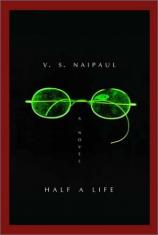Half a Life
Review
Half a Life
Before the days when the Oprah seal of approval guaranteed an increased audience, and before Jonathan Franzen discovered he could increase his notoriety --- if not his sales --- by making dismissive comments about Ms. Winfrey until she retracted her invitation for him to appear on her show, there were other coveted seals that improved an author's reputation and sales: the National Book Award, the Booker Prize, the Pulitzer Prize, and at the top of the heap, the Nobel Prize for Literature.
What sets the Nobel Prize apart from all the other honors, including Oprah's nod, is that it is awarded not for a single book but for a distinguished body of work, meaning an author's backlist may benefit from the recognition as much as his or her current novel. Be that as it may, V. S. Naipaul, this year's recipient of the Nobel Prize for Literature, has managed to combine the power of the honor with the power of great timing, as his first novel in seven years, HALF A LIFE, hit bookstore shelves just days after the announcement that he had won the award.
The release of HALF A LIFE at this time is good news for Naipaul, because much of the press coverage of his selection as the Nobel Prize winner focused on his outspoken political views concerning Islam and its adherents. In light of the events of September 11 and the subsequent "War on Terrorism," many have suggested that the decision to give the award to Naipaul was as much political as it was literary. However, HALF A LIFE serves to remind the reader that, politics aside, Naipaul is a master craftsman, worthy of this high honor.
HALF A LIFE is the story of Willie Chandran, an individual desperately seeking to define himself qua himself. Fathered by a man of high caste in India who married far beneath himself, Willie feels conflicted about his identity at an early age. Leaving India to study in London, he embarks on a literary career --- and a series of sexual misadventures --- in which he is little more than a borrower, borrowing story ideas from movies and borrowing sexual partners from his friends. A woman from Africa, in love with his writing as much as with him, offers him escape from London, and he spends 18 years in a Portuguese colony in Africa, struggling to define himself but instead losing what little sense of himself he might have had.
The novel is brief but dense, as Naipaul sets a contemplative pace with a narrative that doubles back upon itself and changes perspective several times. The book is not one of action so much as one of reflection, with Willie constantly examining how his actions and the actions of those around him serve to sharpen or obscure his view of himself. Naipaul's characters are well–drawn and memorable, while the relentless unraveling of nearly all of their lives infuses the novel with a melancholy resonance that Willie seems unlikely to ever escape despite his best efforts.
While it might be possible to argue that HALF A LIFE is an example of the triumph of style over substance in literature, Naipaul's quiet tale of a life lived on terms other than those of one's own choosing is moving and memorable, providing a window into one life that might serve as a mirror for our own.
Reviewed by Rob Cline on October 16, 2001
Half a Life
- Publication Date: October 16, 2001
- Genres: Fiction
- Hardcover: 224 pages
- Publisher: Knopf
- ISBN-10: 0375407375
- ISBN-13: 9780375407376





